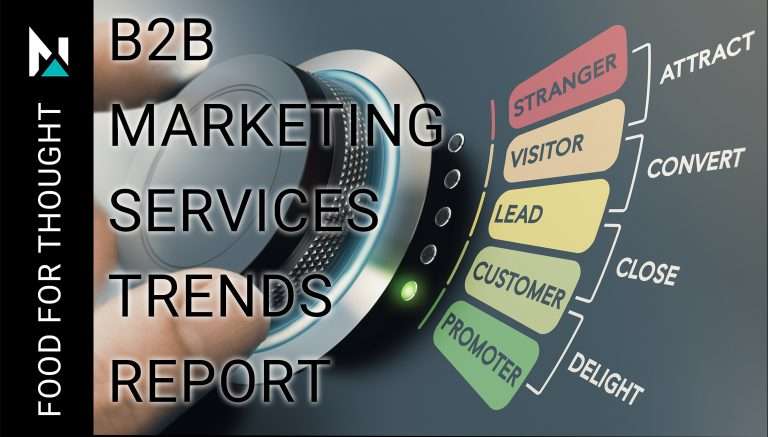Nov 17, 2022
B2B Marketing Agency Benchmarking Report
A B2B marketing agency benchmarking report to tell how well your strategies are working
 How do you know that your B2B marketing strategies are working? That’s a complicated question. You’re probably using dozens of different marketing and advertising strategies for your business. Your business isn’t exactly like any other. Your spending and strategic direction have likely changed over the years. And on top of all that, it’s hard to define precisely what constitutes adequate performance versus reaching your full potential.
How do you know that your B2B marketing strategies are working? That’s a complicated question. You’re probably using dozens of different marketing and advertising strategies for your business. Your business isn’t exactly like any other. Your spending and strategic direction have likely changed over the years. And on top of all that, it’s hard to define precisely what constitutes adequate performance versus reaching your full potential.
But better understanding your marketing results, and using that understanding to improve your marketing efforts in the future, is much easier when you have the help of a B2B marketing agency benchmarking report.
What exactly is this report? How can you create it? And what are the best ways to use it to increase your marketing results in the future?
What Is a B2B Marketing Agency Benchmarking Report?
Most B2B businesses invest heavily in marketing, hoping to drive more traffic to their website, get their foot in the door to better professional relationships, and ultimately land more deals. But if you’re operating blindly, those marketing efforts will fail to perform – or at the very least, they’ll never reach their full potential.
A B2B marketing agency benchmarking report is a thorough form of documentation that allows you to review your marketing results as they compare to other standing “benchmarks.” For the most part, this can be broken down into two categories: comparing your current marketing results against your past marketing results and comparing your current marketing results against your current competitors.
In the former case, you’ll establish performance benchmarks based on what you’ve done in the past. For example, you might identify 5,000 monthly organic visitors to your site as an average over the past year. If you’re now getting 6,500 monthly organic visitors to your site, you have a clearly defined trajectory of improvement.
In the latter case, you’ll establish performance benchmarks based on how you’re doing compared to your competitors. So, for example, if you find out that your top competitor is getting 15,000 monthly organic visitors while you’re still getting 6,500, you’ll know you’re falling behind the curve.
The exact nature of the report will vary depending on your goals, your business, and your specific marketing strategies. However, the bottom line purpose of the report is to help you understand where your marketing and advertising strategies stand when compared to meaningful existing benchmarks.
Once you understand this, you can take action on these insights and better optimize your approach to marketing, advertising, and even sales.
Why Is a B2B Marketing Agency Benchmarking Report Important?
There are several reasons:
- Evaluating overall progress. For starters, this is an opportunity to evaluate your overall marketing progress. Comparing to benchmarks of your past performance is especially powerful in this regard. If you want your business to succeed, you need to keep progressing forward, generating more revenue, landing more customers, and making your capital investments work harder. You can’t simply assume that you’re making this progress without an objective measurement – and a benchmarking report can objectively prove it.
- Identifying weak points. This benchmarking report is also essential for identifying weak points in your strategy. For example, are there specific approaches to marketing and advertising that simply aren’t working for your brand? Are you overspending in an area that isn’t performing adequately? If so, this is your opportunity to correct the issue and make a substantial improvement.
- Identifying strengths. Conversely, this is also an opportunity to identify your most significant strengths. Which of your strategies are leading to the most conversions? Which competitors are you absolutely dominating and why? If you better understand what you’re best at, you can double down on your investments and ultimately see even better results.
- Proving value. A marketing benchmarking report can also be helpful when trying to prove the value of your strategies or the value of specific investments. For example, if you’ve hired a B2B marketing agency, a marketing benchmarking report can help you quickly discern whether this agency is actively improving your results. If you’re in charge of the marketing department of this business, you can also prove your own value with this type of report.
- Driving actionable change. Marketing and advertising specialists thrive on data to drive actionable change, and your B2B marketing agency benchmarking report is probably the most crucial tool. Once you understand where you stand when compared to your past efforts and current competitors, you can form insights that lead you to make substantial improvements to your approach.
How to Create a B2B Marketing Agency Benchmarking Report
In your B2B marketing agency benchmarking report, you’ll want to look at all your B2B marketing strategies, comparing them against your past and current competitors. If you’re currently working with a B2B marketing agency, generating this report is a snap; your agency can pull the data for you, create the report, and even help you understand and take action on that report.
Otherwise, you’ll need to take the following steps:
- Identify your KPIs. First, you’ll need to decide on the key performance indicators (KPIs) and data points you want to track for the report. Which data points are most important to indicate your progress in the marketing space? Which variables significantly influence your overall return on investment (ROI) and B2B marketing success? We’ll discuss some of the most valuable and commonly used variables shortly.
- Document your customer journey. Next, you’ll need to understand your customer journey inside and out. Your B2B marketing benchmarking report will closely examine variables at every customer journey stage, from initial discovery to finalizing a purchase. The better you understand the flow of this customer journey, and the more formally you document it, the easier it will be to put your benchmarking report into the proper context.
- Name your competitors. Benchmarking is especially valuable when you identify top competitors comparable to your business. For example, who are your fiercest competitors in the industry, and what makes them similar to you? You can begin gathering information on them at this stage to create a more apt comparison.
- Gather past data. You’ll also need to gather data about your business’s past performance in the marketing and advertising realm. This should be convenient for you if you use an integrated marketing dashboard or already have all your marketing data in one place. However, you’ll need to spend time pruning your reports to focus only on the most meaningful and actionable data.
- Map and compare. Once you have all the information in place, you can start formalizing your report, mapping different data points, and comparing them against each other. Ideally, you’ll present this data in a convenient package, so you can easily compare and contrast your current marketing efforts against your past and existing competitors.
Every benchmarking report will be slightly different since each business will be unique. However, our B2B marketing agency benchmarking reports typically include at least the following:
- Search engine rankings. If you’re focusing on search engine optimization in any capacity, or if you’re interested in online traffic, we need to identify search engine rankings for specific keywords and phrases. It’s imperative to understand how you rank when compared to your competitors.
- Organic search traffic. Organic traffic is typically a function of search engine rankings, measuring how many people organically visit your website. This number increases steadily as you increase your search optimization efforts.
- Site visitors (and unique visitors). You’ll also want to know the total number of site visitors and the total number of unique visitors visiting your site. Unique visitors are especially important when studying the discovery phase of your customer journey.
- Specific pageviews. You may also want to know view counts for specific pages within your site. High-page view counts can drive much better results if you have high-quality content, high-converting pages, or other valuable pages.
- Visit duration. How long are people spending on your website or specific pages? Longer visit durations typically indicate higher user engagement and better metrics across various variables.
- Direct traffic and repeat traffic. Are you getting repeat visitors and direct traffic? And how are these numbers changing? Higher levels of direct and repeat traffic indicate a valuable impression on your target audience.
- Conversions (trials, demos, contacts, etc.) Pay attention to the conversions you get on-site, such as people signing up for demos and trials or people filling out contact forms.
- Abandoned forms. Form abandonment can be a lead-generation killer, so it’s important to study this metric and improve it with strategic changes if necessary.
- Paid ad traffic. Are you running a paid advertising campaign? If so, how is it improving, and how does it compare to your competitors’ paid advertising campaigns?
- Purchases. You might generate lots of traffic and leads, but are people buying what you’re selling? This is as relevant to sales as marketing, but it’s still important to include it in your benchmarking report.
- Adoption and usage. Thinking long term, after purchasing with your brand, are your usage and adoption rates among customers improving? Do you have the edge over your competition in this area?
- Social media mentions. Getting mentioned on social media in a positive context is free publicity and an indication that your customers are satisfied. How do your social media mentions compare to those of your past and those of your competitors?
- Reviews and testimonials. Are your customers leaving reviews? How do those reviews compare to your standing benchmarks?
Better Benchmarking With a Marketing Agency That Knows B2B
Are you interested in seeing where you stand when compared to your competitors? Or are you just looking for better marketing results overall for your B2B business? Then, you’re in the right place. NewPoint Marketing is a seasoned B2B marketing agency that focuses heavily on companies in the food and beverage space.
If you’re interested in learning more or are ready to optimize your approach to marketing and advertising, contact us for a free consultation today!






